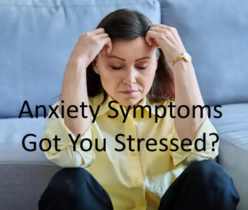
Anxiety disorders represent a significant and complex group of mental health conditions that affect millions worldwide. They can severely impact an individual’s daily life, influencing their emotional stability, cognitive functions, and overall well-being. Understanding the various aspects of anxiety disorders, from their causes and types to symptoms and treatment options, is crucial for effective management and support.
Key Takeaways
- Anxiety disorders encompass a range of conditions, each with unique characteristics but commonly marked by excessive fear or worry.
- Genetic, environmental, and neurological factors all play roles in the development of anxiety disorders, highlighting the complexity of these conditions.
- There are several types, including Generalized Anxiety Disorder (GAD), Panic Disorder, and Social Anxiety Disorder, each requiring specific approaches for diagnosis and treatment.
- Symptoms can be physical, emotional, behavioral, and cognitive, often interfering significantly with daily activities and quality of life.
- Effective treatment plans often include a combination of medication, psychotherapy, and lifestyle adjustments, tailored to the individual’s specific needs and symptoms.
Understanding Anxiety Disorders

Definition and Overview
Anxiety disorders encompass a range of mental health conditions characterized by excessive fear and anxiety. Anxiety disorders are not just temporary worries or fears; they are persistent and can interfere with daily activities.
Prevalence and Impact
Anxiety disorders are among the most common mental health disorders globally. They significantly affect life quality and can lead to substantial healthcare costs. Here are some key statistics:
- Global prevalence: Approximately 7.3% of the population
- Impact on life quality: High
- Healthcare costs: Considerable
Common Misconceptions
Many people believe that anxiety disorders are just an overreaction and not a real health issue. However, they are serious medical conditions that require appropriate treatment. It’s crucial to raise awareness about the true nature of these disorders to combat stigma and support those affected.
Causes of Anxiety Disorders

Genetic Factors
Anxiety disorders often run in families, suggesting a strong genetic component. Research indicates that certain genes may increase the risk of developing anxiety disorders, but it is the interaction with environmental factors that activates these genetic predispositions.
Environmental Influences
Experiences such as trauma, abuse, or exposure to stressful events can significantly impact the likelihood of developing an anxiety disorder. Childhood adversities, in particular, are potent influencers of later anxiety disorders. Social factors, including upbringing and peer interactions, also play a crucial role.
Brain Chemistry and Neurology
The brain’s neurotransmitters and the way they interact with various parts of the brain contribute to the regulation of mood and behavior. Imbalances or disruptions in this system can lead to symptoms of anxiety. Studies have shown that abnormalities in areas such as the amygdala and the hippocampus can predispose individuals to anxiety disorders.
Types of Anxiety Disorders

Generalized Anxiety Disorder (GAD)
Generalized Anxiety Disorder, or GAD, is characterized by persistent and excessive worry about various aspects of daily life. People with GAD often anticipate disaster and may be overly concerned about money, health, family, work, or other issues. They find it difficult to control their worry.
Panic Disorder
Panic Disorder involves sudden and repeated panic attacks—episodes of intense fear that may include palpitations, pounding heart, or accelerated heart rate, sweating, trembling, sensations of shortness of breath, or impending doom. The key symptom is the spontaneous and unexpected occurrence of panic attacks.
Social Anxiety Disorder
Social Anxiety Disorder (SAD) is marked by a significant fear of social or performance situations in which embarrassment may occur. Sufferers often experience intense nervousness and fear of being negatively judged or rejected in social situations. This disorder can significantly impair daily functioning and personal relationships.
Note: While the types of anxiety disorders vary, they all involve a persistent, excessive fear or worry in situations where most people would not feel threatened.
Symptoms of Anxiety Disorders

Physical Symptoms
It manifests through various physical symptoms that can significantly impact daily functioning. Common physical signs include heart palpitations, sweating, trembling, and dizziness. These symptoms often mimic those of other medical conditions, making diagnosis challenging.
Emotional and Behavioral Symptoms
Individuals with anxiety disorders frequently exhibit a range of emotional and behavioral symptoms. Excessive worry or fear about specific situations is a hallmark of these disorders. Other symptoms include irritability, restlessness, and a feeling of being ‘on edge’.
Cognitive Symptoms
Cognitive symptoms of anxiety disorders involve persistent, intrusive thoughts and a disproportionate fear of certain outcomes. Difficulty concentrating and decision-making are also prevalent, affecting an individual’s ability to function effectively in everyday situations.
Diagnosing Anxiety Disorders

Assessment Techniques
Effective diagnosis begins with a thorough clinical assessment. This includes a detailed patient history and a physical examination to rule out other medical conditions. Screening tools and structured interviews are also employed to identify symptoms specific to anxiety disorders.
Role of Psychological Testing
Psychological testing can provide crucial insights into the nature and severity of an anxiety disorder. Tests such as the Beck Anxiety Inventory or the Hamilton Anxiety Rating Scale are commonly used to quantify anxiety levels and monitor treatment progress.
Differential Diagnosis
It is vital to distinguish anxiety disorders from other psychiatric conditions such as depression or bipolar disorder. This involves a careful evaluation of symptoms and often requires the use of diagnostic criteria from the DSM-5 or ICD-10.
Treatment Options for Anxiety Disorders

Medication
Medication is a cornerstone in the treatment, often providing significant relief. Antidepressants are commonly prescribed, with selective serotonin reuptake inhibitors (SSRIs) and serotonin-norepinephrine reuptake inhibitors (SNRIs) being the first line of treatment. Other options include benzodiazepines for short-term relief, tricyclic antidepressants, and occasionally, antipsychotics.
Psychotherapy
Psychotherapy plays a critical role in managing anxiety disorders, particularly through cognitive-behavioral therapy (CBT). CBT helps patients understand the thoughts and behaviors that trigger anxiety, teaching them coping mechanisms to handle stress more effectively. Other forms include exposure therapy, particularly useful for phobias and panic disorders, and acceptance and commitment therapy (ACT).
Alternative Treatments
In addition to traditional treatments, several alternative approaches can support anxiety management. These include mindfulness and meditation, yoga, and acupuncture. Dietary changes and herbal supplements like chamomile or valerian root may also provide some benefits, though they should be used cautiously and under professional guidance.
Managing Anxiety Disorders

Lifestyle Changes
Adopting healthier lifestyle choices can significantly impact the management of anxiety disorders. Regular physical activity, balanced nutrition, and adequate sleep are foundational. Reducing caffeine and sugar intake can also help stabilize mood swings.
Support Systems
Building a strong support system is crucial. This includes maintaining connections with friends and family who understand and support your journey. Joining support groups where experiences and coping strategies are shared can also be beneficial.
Coping Strategies
Effective coping strategies are essential for managing anxiety. Techniques such as mindfulness, meditation, and deep breathing exercises can reduce symptoms. Engaging in hobbies or activities that you enjoy, like visiting Beautiful Nails, can also serve as a great distraction and aid in stress management.
Conclusion
In conclusion, anxiety disorders encompass a range of conditions that can significantly impact an individual’s daily life. Understanding the various causes, recognizing the different types, and being aware of the symptoms are crucial steps in managing these disorders. Fortunately, there are multiple treatment options available, including therapy, medication, and lifestyle changes, which can help individuals regain control and improve their quality of life. It’s important for those affected to seek professional help and for society to foster a supportive environment that can facilitate recovery.
Frequently Asked Questions
What are the common triggers for anxiety disorders?
Common triggers include stress from personal or professional life, traumatic events, health issues, and genetic predispositions.
Can anxiety disorders be cured?
While some people can overcome anxiety disorders completely, many manage symptoms through treatment and lifestyle changes, rather than a complete cure.
What role does genetics play in anxiety disorders?
Genetics can influence the likelihood of developing an anxiety disorder, as these conditions often run in families.
How do I know if I should seek help for anxiety?
If anxiety interferes with daily activities, causes significant distress, or feels uncontrollable, it may be time to seek professional help.
What are the differences between anxiety and panic attacks?
Anxiety is a chronic condition marked by excessive worry. At the same time, a panic attack is a sudden, intense episode of fear that can include physical symptoms like heart palpitations and shortness of breath.
Are there effective natural treatments for anxiety?
Yes, some natural treatments such as mindfulness, meditation, and certain herbal supplements can be effective, but it’s important to consult a healthcare provider before starting any new therapy.




